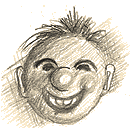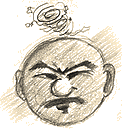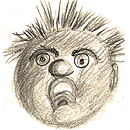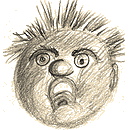What Are The Seven Emotions?
As responses to external stimuli, our emotions not only affect how we are psychologically feeling, but also affect our physiological functions and can play a role in disease development. Traditional Chinese medicine (TCM) regards them as manifestations of physiological functions in the organs, which mainly involve the heart, liver, spleen, lungs and kidneys. Emotions are adjustments the body makes to accommodate the external environment. Essence and qi (vital energy) constitute the material basis for emotional activities and are supply by internal organs. A harmonious internal environment is necessary for healthy emotional response.
As The Plain Questions says: “The five zang organs of the human body produce five kinds of essential qi, which bring forth joy, anger, grief, worry, and fear.” TCM believes that certain organs are related to emotional activities, i.e. the heart is related to joy, the liver to anger, the spleen to anxiety, the lungs to sadness and the kidneys to fear.
From long-term observation, TCM physicians summed up that joy, anger, worry, anxiety, sadness, fright, and fear, known as the “seven emotions,” are the most commonly experienced. Within normal limits, these emotions cause no harm. However, when they become uncontrollable and overwhelming, particular outbursts can cause damage to specific organs. For example: anger impairs the liver, over-joy impairs the heart, sadness and worry impair the lungs, over-thinking or anxiety impairs the spleen, and fright and fear impair the kidneys. While Western physicians tend to stress the psychological aspects of psychosomatic ailments, the pathological damage to the internal organs is very real indeed and is of primary concern of the TCM physicians. Once physical damage has begun, it is insufficient to eliminate the offending emotion to affect a cure; the prolonged emotional stress will require physical action as well.
Diseases that resulted from extreme emotions have the following features:
- Different emotional stimulations affect the internal organs differently;
- The manifestations are usually related to dysfunctions of corresponding organs; e.g. anger impairs liver, and causes blood and qi rushing to upper body, resulting in spitting blood or fainting; anxiety impairs the spleen, and will causes digestive problems like poor appetite, abdominal distention and diarrhea.
- On the contrary, organ dysfunction, blood and qi disharmony, and bodily imbalance can also lead to mental problems; e.g. liver yin (blood) deficiency tends to make people anger easily; excess heart fire may make people become delirium.
The Seven Emotions in TCM
– Joy – Anger – Worry – Anxiety – Sadness – Fear – Fright –
Extreme and prolonged emotional stimulations weaken the internal organs, especially disturb their qi movements. Clinical manifestations that resulted from emotional damages are as follows:
Joy
 “When one is excessively joyful, the spirit scatters and can no longer be stored,” states in The Vital Axis. This refers to a state of agitation or over excitement rather than the more passive notion of deep contentment, which damages the heart and scatters its qi. The heart stores the shen, an important aspect of mind or spirit in TCM. Over-joy weakens the heart and causes an unsettled mental state, individuals may experience difficulty concentrating, be absent minded, feeling disoriented, mental fatigue and palpitations. In extreme cases, mania may develop.
“When one is excessively joyful, the spirit scatters and can no longer be stored,” states in The Vital Axis. This refers to a state of agitation or over excitement rather than the more passive notion of deep contentment, which damages the heart and scatters its qi. The heart stores the shen, an important aspect of mind or spirit in TCM. Over-joy weakens the heart and causes an unsettled mental state, individuals may experience difficulty concentrating, be absent minded, feeling disoriented, mental fatigue and palpitations. In extreme cases, mania may develop.Anger

Anger (resentment, rage, frustration) usually damages the liver, and makes qi ascending upwards to the upper body, and also brings the blood upwards. Individuals may experience symptoms such as dizziness, headache, a flushed face, ear ringing, hypertension and weakness in the lower limbs. The disordered liver may further affect other organs and cause more health problems. For example, when it attacks the spleen, there will be abdominal distention, diarrhea immediately after eating or passing stools with undigested food; when it upsets the stomach, then it will develop vomiting or hiccough. Anger may also damage the kidneys and deplete essence storage, and so leads to a feeling of unpleasant fear, forgetfulness, and lumbar weakness.Sadness and Worry
 Sadness, sorrow, grief or worry damages the lungs and depletes qi. A normal and healthy expression of grief can be beneficial to the lungs, as sobbing promotes deep breathes and the expulsion of air from the lungs. However, sadness that remains unresolved and becomes chronic weakening the lungs, interfering with its function of circulating qi around the body. Thus individuals may feel low-spirited, breath shortness, chest stuffiness, difficulty breathing and lassitude. Excessive sadness may also damage the heart and spleen that lead to palpitations, an absent minded, distention in the gastric and abdominal regions.
Sadness, sorrow, grief or worry damages the lungs and depletes qi. A normal and healthy expression of grief can be beneficial to the lungs, as sobbing promotes deep breathes and the expulsion of air from the lungs. However, sadness that remains unresolved and becomes chronic weakening the lungs, interfering with its function of circulating qi around the body. Thus individuals may feel low-spirited, breath shortness, chest stuffiness, difficulty breathing and lassitude. Excessive sadness may also damage the heart and spleen that lead to palpitations, an absent minded, distention in the gastric and abdominal regions.Anxiety

Anxiety, pensiveness, or dwelling too much on a particular issue leads to stagnated qi flow. Any activity that involves a lot of mental effort will cause disharmony and the organ most directly at risk is the spleen. Since the spleen in TCM is responsible for digestive functions, the likely symptoms are poor appetite, stomach upset, abdominal bloating, belching, acid reflux and loose bowels. In addition, being focused for too hard and too long consumes heart blood, which can result in a poor-nourished mental state, and there will be palpitations, poor memory insomnia or dream-disturbed sleep.Fear

Fear is a normal and adaptive human emotion. But when it becomes chronic and when the perceived cause of the fear cannot be directly addressed, then it is likely to result in disharmonies. Fear damages the kidneys and makes qi decline. Living in fear tends to develop qi sinking conditions such as stool and urine incontinences, seminal emission, and premature ejaculation. In addition, when the kidneys can’t supply adequate essence to nourish the heart and lungs, there will be panic, heart palpitations, depression, indecisive, lack courage, restlessness, poor sleep, tightness in the chest and abdominal distention.Fright

Excess of Certain Emotions Affects a Particular Zang-organs
| Anger | Liver |
| Joy | Heart |
| Sadness and Worry | Lungs |
| Anxiety | Spleen |
| Fear (Fright) | Kidneys |


